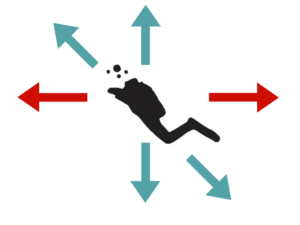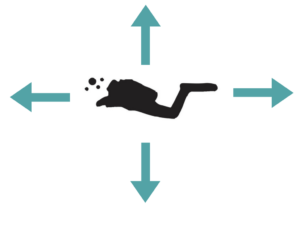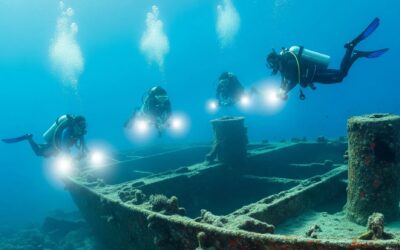Previously (read our previous Buoyancy Sessions) you have learnt how to be proper weighted and to perform a perfect descent. Once at the bottom, it is time to decide in which position you will dive. That “small” decision is more important than what it may seem. Today we introduce a new word: The Trim.
Trim
An unknown term for many divers. The trim is the biggest victim of the rush and the lack of training that sometimes, due to the tight schedule, we neglect. Trim is not only a great unknown for many divers, but also for many recreational diving professionals. And, in turn, the trim is very important in achieving perfect buoyancy and minimum air consumption.
WHY IS TRIM IMPORTANT?
1 – Hydrodynamics
It is important to understand that water is a medium 800 times more dense than the air. Therefore, any movement in this habitat will cost us a huge amount of energy. When diving, one of our main objectives is to be as still as possible to avoid useless energy losses. When you waste energy underwater you dramatically increase your air consumption. In turn, it is important to maintain your position as hydrodynamic as possible. Think that advancing is the action to which we will devote the most energy while we dive. Let’s take a look to the divers:
Without doubt, the position of diver A is less hydrodynamic. He will require much more energy to move than diver B. In other words, diver B will move many more meters with a single kick than diver A. Therefore, for the same distance diver A will need to give many more kicks than diver B.
2 – Direction:
 Diver A:
Diver A:
When kicking diver A will ascend diagonally. If he knows how to back kick he can go down diagonally. By breathing in or adding air to the BC he will ascend. Deflating or exhaling he will descend. -It is impossible that he can perform a perfect and efficient forward displacement-His only options are to go up or down-Due to the fact that when he kicks he ascends, it will create on him the false feeling that he needs more weight -He will move in an ascent /descent inertia. His buoyancy will be in constant change on each kickThis vertical position brings him only disadvantages.
Diver  B:
B:
This diver obtains a great amount of possibilities while maintaining the horizontal position. When swimming he will move forward. By back kicking he could move backwards. Inflating the BC or breathing in he will go upwards and the opposite while exhaling or deflating BC. Thus, the diver B can move efficiently in any direction. He won’t get any false buoyant feeling every time he kicks. The horizontal position brings us only advantages.
3 – Respect
This is the most important point. You might think that a bad trim is just something that affects you. But it is not. If you have a bad trim, others will pay for it. When swimming in vertical position, you move a great amount of water towards the bottom. If this bottom is sandy, you will be lifting a large amount of sediment. You will be dramatically reducing the visibility for any diver coming after you and yes, most probably he will hate you.
In addition, if you are diving over a sensitive bottom, when swimming vertically you could be hitting the bottom with your fins, so you could be killing corals or other life that inhabits the grounds. So, for that respect towards other divers and more importantly, to preserve the aquatic life, please start from now to realise that when we dive, we do it in a horizontal position.
Take your next step. Improve Your Trim!



